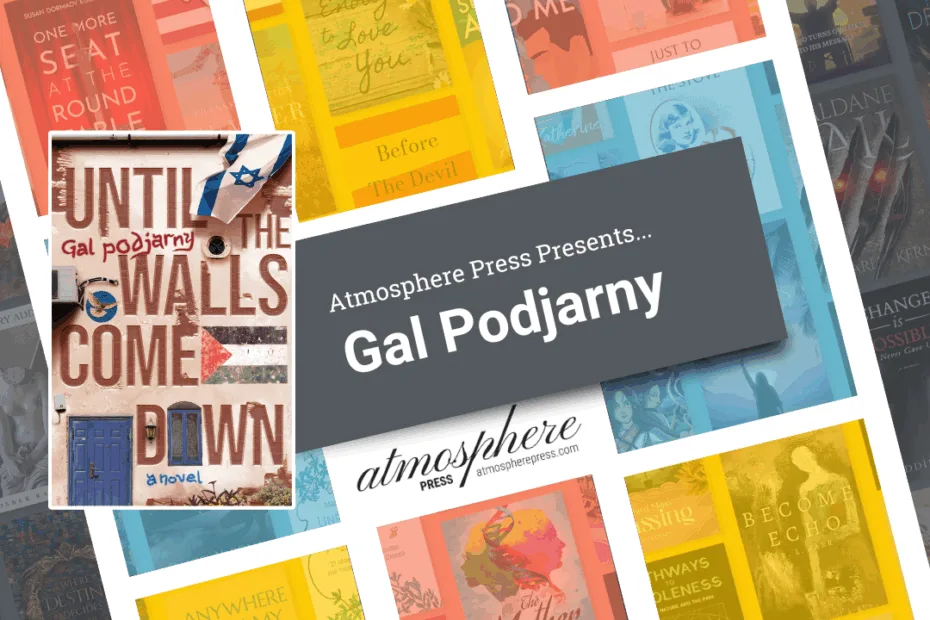An Interview with Gal Podjarny

Gal Podjarny was born and raised in Israel/Palestine and has made homes in Canada and the UK. She draws from these diverse cultural landscapes to examine how social forces shape personal narratives and relationships. Her writing, including the short story collection Human Fragments and contributions to various anthologies, captures these intersections of identity and community. From her home in London, she continues this exploration through her blog at galpod.com and her work with the Disrupt Foundation. This is her first novel.
Tell us the story of your book’s title. Was it easy to find, or did it take forever?
I actually gave an early draft of my book to an LLM (Large Language Model) to see what it would come up with. I’ve been playing with this technology since it started being widely available. It can’t write well, but it’s very good with stuff like titles. It spat out a few titles, and one of them was Until the Walls Come Down, which I really liked. While it’s not mentioned explicitly, the separation wall that has been built through Israel/Palestine has been one of the main images in my head while writing the book. I think the physical separation plays a very big role in why we cannot seem to speak to each other.
How did it feel when you first saw your book cover? Or when you first held your book in your hands?
When I got a parcel that felt like a book, I tried to remember whether I was expecting a book delivery. When I opened the parcel, it took me a moment to realise that—wait, this is my book. Holding the physical book in my hands was much more visceral than I thought it would be. I was also surprised for some reason by the heft of it. It felt like an actual book.
Who/what made you want to write? Was there a particular person, or particular writers/works/art forms that influenced you?
Looking back, I realise that I’ve always found ways to tell stories. I blogged throughout my PhD in developmental psychology, trying to coalesce my research work with parenting two young children. When we moved to London, I started taking literature courses—first at City College and then with the London Lit Salon—which gave me the confidence that my contributions could be valuable. After floundering for a while, I found my mentor, Lucy Hay, who convinced me that I can, in fact, write a book. She was right.
What other professions have you worked in? What’s something about you that your readers wouldn’t know?
I learned software programming when I served in the army (Israel has a mandatory draft for men and women). After my service ended, I worked as a software developer for two years, but I never considered it a career—it just beat waiting tables (I waited tables for four months. I was terrible). I got laid off towards the end of my second year in university, which was a relief, as my studies were getting more demanding.
What was the most rewarding/meaningful part of publishing your book?
I think what surprised me most was that people actually read it. The most bizarre experience was sitting with a few friends, and two of them were discussing the book, commenting on how they connected to it. It was so shocking to see people engaging with words that were not that long ago entirely in my head, like the book had earned its place in the world. It shifted something fundamental about how I see my own voice as worth listening to.
If your book had a soundtrack, what are some songs that would be on it?
Definitely some Rasha Nahas (Palestinian indie rock) for Ali. Ugly Kid Joe for Tammar—she likes to play Everything About You and dance (well, flail) in the kitchen after a particularly stressful day. Barak’s musical taste is rather unfortunate, but we can compromise on some classic Israeli rock (Shlomo Artzi, probably). Daniel doesn’t listen to music, which I find a shame; I think he would like Red Hot Chilli Peppers for brooding.
What is one thing you hope readers take away from reading your book? How do you envision your perfect reader?
What I’d love is for readers to feel less intimidated about having difficult conversations. It’s an incredibly polarising topic that many people avoid discussing. We end up hearing opinions that are very skewed to one side or the other. I hope readers see that you can engage seriously with this conflict without choosing a side or becoming an expert first. That you can sit with complexity instead of fleeing to simple answers. And I’d love for people to glimpse the complex, diverse society currently living in Israel/Palestine.
What creative projects are you currently working on?
I’m slowly starting to work on another novel. I’m not sure exactly what it would be about, but I’m interested generally in how our work defines us and what that looks like in an AI era.
How was working with Atmosphere Press? What would you tell other writers who want to publish?
I had a positive experience with Atmosphere—I felt I had someone to answer all my publication questions. I particularly enjoyed the editorial process. Asata, my editor, really understood what I was trying to do with the book and helped me get there.
Are you a writer, too? Submit your manuscript to Atmosphere Press.

Atmosphere Press is a selective hybrid publisher founded in 2015 on the principles of Honesty, Transparency, Professionalism, Kindness, and Making Your Book Awesome. Our books have won dozens of awards and sold tens of thousands of copies. If you’re interested in learning more, or seeking publication for your own work, please explore the links below.
